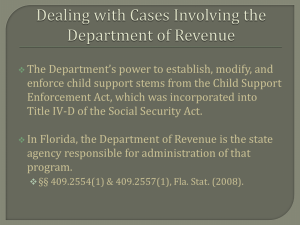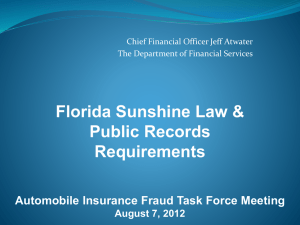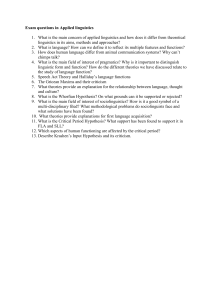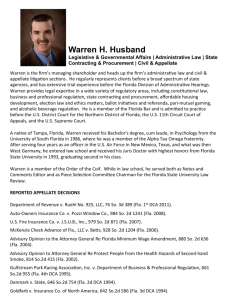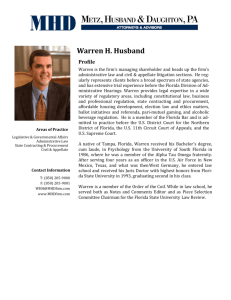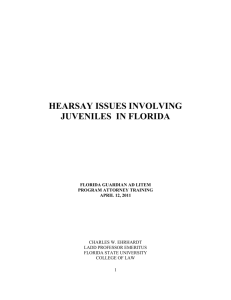EVIDENCE ISSUES INVOLVING - Florida Guardian ad Litem
advertisement
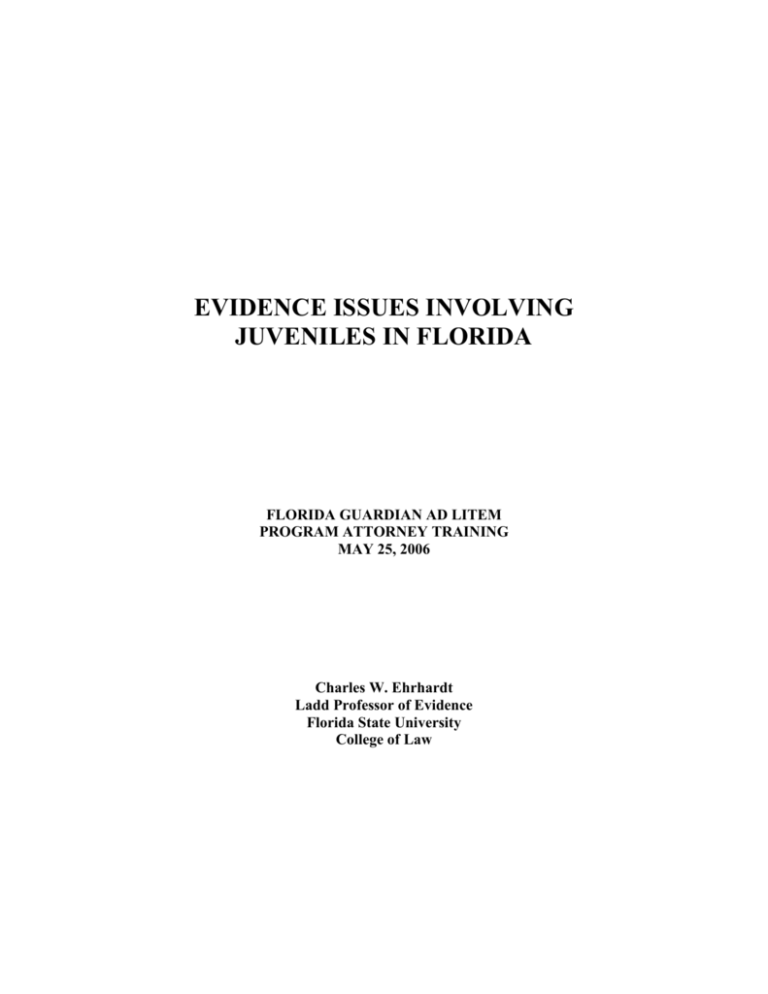
EVIDENCE ISSUES INVOLVING JUVENILES IN FLORIDA FLORIDA GUARDIAN AD LITEM PROGRAM ATTORNEY TRAINING MAY 25, 2006 Charles W. Ehrhardt Ladd Professor of Evidence Florida State University College of Law ADMISSIBILITY OF HEARSAY A. Definition of Hearsay 1. Out-of-Court Statement Keen v. State, 775 So.2d 263 (Fla. 2000)(Officer’s testimony that after communicating with insurance company and defendant’s brother, police officer prepared an arrest warrant for the defendant was hearsay because the clear inference was that the insurance companies and brother said that the defendant was implicated in a murder.). Saintil v. State, 901 So.2d 336 (Fla. 4th DCA 2005)(Testimony that officer received a crime-stopper’s tip and proceeded to hotel room where he stated when the door was opened that he was Athere to investigate a complaint of narcotics dealing from that hotel room was hearsay.). Diaz v. State, 890 So.2d 556 (Fla. 5th DCA 2005)(Testimony of undercover officer that he had a conversation with a person which led him to believe that the defendant was a drug dealer. AIf the declarant’s statement would be hearsay if the witness directly quoted the declarant, then the testimony is inadmissible no matter how circumlocutory the witness is. If, however, the declarant’s statement is non-hearsay, or if it falls within an exception to the hearsay rule, then it is admissible even if it is incriminating.) Bowe v. State, 785 So.2d 531 (Fla. 4th DCA 2001)(Testimony concerning caller I.D. readout and the numbers appearing on the digital display of a pager was not hearsay. A[O]nly statement made by persons fall within the definition of hearsay.). 2. Offered to prove truth of matter asserted. Saintilus v. State, 869 So.2d 1280 (Fla. 4th DCA 2004)(AIn spite of substantial authority condemning this attempt to adduce prejudicial hearsay, the state often persists in offering this kind of hearsay to explain the `state of mind of the officer who heard the hearsay, or to explain the logical sequence of events during the investigation leading up to an arrest. This type of testimony occurs with the persistence of venial sin. The state’s insistence on attempting to adduce this particular brand of hearsay requires trial judges to be constantly on their guard against it. The essence of the officer’s testimony here was that unnamed witnesses had identified someone named Tutu as being involved in the robbery. Another detective sought to establish that Tutu was in fact the defendant, based on information he received from still other police officers. The only purpose of this testimony was to admit these hearsay statements to link defendant to the crimes, even though such hearsay is clearly inadmissible.). Keen v. State, 775 So.2d 263 (Fla. 2000)(The state’s offer of this evidence to show a Asequence of events@ did not avoid a hearsay objection. A[T]here is no relevancy for such testimony to prove or establish such a nonissue. When the only possible relevance out-of-court statement is directed to the truth of the matters stated by a declarant, the subject matter is classic hearsay even though the proponent of such evidence seeks to clothe such hearsay under a nonhearsay label.). Acosta v. State, 825 So.2d 1076 (Fla. 4th DCA 2002) (Officer’s testimony that he had spoken with a number of people who had confirmed crime victim’s version of what happened was hearsay.). Foster v. State, 778 So.2d 906 (Fla. 2000)(The non-hearsay purpose for which that statement is offered must relate to a material issue in the case and its probative value must not be substantially outweighed by its prejudicial effect.). B. Hearsay Exceptions 1. Statements for Purpose for Medical Diagnosis and Treatment Llanos v. State, 766 So.2d 1219 (Fla. 4th DCA 2000)(In aggravated battery prosecution, error to admit portion of victim’s medical report containing statement: A[P]atient has had domestic violence with a boy friend.... There was no showing that the statement was made for the purpose of medical diagnosis or treatment. The offending hearsay, clearly, is not reasonably pertinent to the diagnosis or treatment of the victim’s injuries. Lemon v. State, 767 So.2d 620 (Fla. 3d DCA 2000)(Testimony of physician who examined minor sexual battery victim concerning Aher narration of pertinent events was admissible under section 90.803(4).). State v. Jones, 625 So.2d 821 (Fla. 1993)(Statements to medical personnel by victims of child sexual abuse identifying their abuser are not admissible under section 90.803(4).). 2. Child Abuse Victim Exception. Section 90.803(23) a. Statement of Child Abuse Victim who is Eleven or Less Blanton v. State, 880 So.2d 798, 800 (Fla. 5th DCA 2004)(90.803(23) applies to a victim who was eleven or less at the time the statement was made but over age 11 at the time of trial.). b. Case-Specific Finding of Reliability Feller v. State, 637 So.2d 911 (Fla. 1994)(Trial judge Ais charged with determining the reliability of the hearsay statements prior to their admission.). Perez v. State, 536 So.2d 206 (Fla. 1988)(Although personal examination of the child before the trial judge is not always required under section 90.803(23) it is Agenerally preferable.). Townsend v. State, 635 So.2d 949 (Fla. 1994) (Trial judge must make a case-specific finding of reliability but cannot consider for this purpose evidence which corroborates the truth of the child’s statements.). c. (1) Child Testifies OR (2) Is unavailable (Corroboration of Abuse is Required) Townsend v. State, 635 So.2d 949 (Fla. 1994) (Child who is found not competent is unavailable for purpose of section 90.803(23). Lack of competence is a factor to consider on issue of reliability. (3) Corroboration Ghelichkhani v. State, 765 So.2d 185 (Fla. 4th DCA 2000)(Evidence was not sufficient to corroborate when it established opportunity but did not Aconfirm that the charged offense occurred.). Jones v. State, 728 So.2d 788, 791 (Fla. 1st DCA 1999) ([W] e hold that similar fact evidence may be used to satisfy the requirement of other corroborative evidence of the abuse or offense . . . In deciding whether such evidence should be accepted as corroborative, trial courts should weigh the evidence in light of the competing interests involved - that of the state in permitting greater use of child victim hearsay and that of the defendant in preventing an unacceptable risk of an erroneous conviction. A trial court’s decision whether to consider similar fact evidence as corroborative for purposes of section 90.803 (23) (a) (2) (b) will be subject to review pursuant to an abuse of discretion standard.). R.U. v. Department of Children & Families, 777 So.2d 1153, 1160 (Fla. 4th DCA 2001)( In dependency hearing, error to admit testimony of counselor concerning statement if child under section 90.803(23) when child did not testify and the only corroboration was the counselor’s testimony concerning other hearsay statements made by the child: [T]he only evidence being used to support N.M.’s hearsay statements is other hearsay statements made by the same child to the same therapist who testified as to the original declarations. The child declarant’s hearsay statements cannot be other corroborating evidence within the same meaning of section 90.803(23)(a)2.b. We read the word other in the rule as denoting evidence derived from a source other than the child victim’s own statements.). Delacruz v. State, 734 So.2d 1116 (Fla. 1st DCA 1999) (Other corroborative evidence requirement of section 90.803(23) cannot be satisfied by statement of victim to grandmother that her vagina area hurt when she was being washed. The opinion was concerned with a defendant being convicted solely on the basis of hearsay if the child’s hearsay statement was admitted to provide corroboration under section 90.803(23). The opinion does not discuss whether the statement to the grandmother was admissible under section 90.803(3), a statement of then-existing physical condition. The opinion also holds that a statement of the defendant which is admissible under section 90.803(18) may be considered as Aother corroborative evidence.) Reyner v. State, 745 So.2d 1071 (Fla. 1st DCA 1999)(Not an abuse of discretion to determine that the contents of the defendant’s out-of-court statement to police officer was sufficient corroboration by itself to corroborate the hearsay statement of a child under section 90.803(23).). Palazzolo v. State, 754 So.2d 731 (Fla. 2d DCA 2000) (Error to permit child abuse investigators to testify during crossexamination to statements made by child abuse victims without laying foundation pursuant to section 90.803(23). Nothing the defense did in this case waived the requirement for a judicial determination of reliability prior to the admission of these statements. We doubt that these statements were admissible within the scope of cross-examination, but even if they were, the rules of hearsay still apply in cross-examination. The court was required to comply with the requirements of section 90.803(23)(a) before admitting the hearsay.). 3. Business Records Jackson v. State, 738 So.2d 382 (Fla. 4th DCA 1999) (In order to be admissible, a business record pursuant to section 90.803(6) (a) must be shown to have been: 1. 2. 3. 4. Made at or near the time of the event; By or from information transmitted by a person with knowledge; Kept in the course of a regularly conducted business activity; and That it was the regular practice of that business to make such a record.). Jackson v. State, 877 So.2d 816 (Fla. 4th DCA 2004) (Bell South computer records of victim’s telephone to defendant’s pager were admissible under section 90.603(6). Computer printouts of computer generated business records A`are admissible if the custodian or other qualified witness is available to testify to the manner of preparation, reliability and trustworthiness of the product. Data compiled and presented in printouts prepared for trial may be admissible under the business record exception, even though the printouts themselves are not kept in the regular course of business. The fact that the information was printed out at the request of a party to the lawsuit does not deprive the printout of its business record character.). Foundation may also be laid by certification or affidavit which complies with section 90.902(11). 1. Personal Knowledge of Employee Reichenberg v. Davis, 846 So.2d 1233 (Fla. 5th DCA 2003)(Reports of investigators for Child Protection Team and Department of Children and Families which contained witness interviews were inadmissible under section 90.803(6) because Athey were not based on the personal knowledge of an agent of an agent of the business.). 2. Opinions and Diagnoses Bradley v. Brotman, 836 So.2d 1129 (Fla. 3rd DCA 2002) (Suggesting that it was error to admit portion of medical record in which non-testifying physician opined that a dog bite did not cause the alopecia. AThis prejudice or confusion [under section 90.403] is more likely to occur in a case where the expert does not testify at trial and is not subject to cross-examination.). 3. Expert Witness Reports McElroy v. Perry, 753 So.2d 121 (Fla. 2d DCA 2000) (Report of Independent Medical Examiner was prepared for the purpose of litigation and lacked the necessary trustworthiness to be admissible under section 90.803(6).). J. Public Record Exception, Section 90.803(8). Trepal v. State, 864 So.2d 405 (Fla. 2003) (Report of Office of the Inspector General of the United States Department of Justice relating to the FBI crime laboratory was inadmissible hearsay.). Burgess v. State, 831 So.2d 137, 140 (Fla. 2002) ([T]he information contained in police reports is ordinarily considered hearsay and inadmissible in an adversary criminal proceeding. Nor does the information contained in the report in question fall under any recognized exception to the hearsay rule. A police report or criminal arrest affidavit is not admissible into evidence as a public record exception to the hearsay rule because that exception excludes in criminal matters observed by a police officer or other law enforcement personnel.). Reichenberg v. Davis, 846 So.2d 1233 (Fla. 5th DCA 2003)(Reports of investigators for Child Protection Team and Department of Children and Families which contained witness interviews were inadmissible under section 90.803(8) because they were not based on the personal knowledge of an agent of an agent of the business.) CONFRONTATION AND CRAWFORD V. WASHINGTON I. The Decision -- 124 S.Ct.1354 (2004) Introduction of wife/accomplice’s taped statement to police when wife asserted privilege to refuse to testify at trial as a declaration against penal interest violated defendant’s confrontation rights. A. Decision specifically abrogated Ohio v. Roberts. B. If declarant testifies at trial and is subject to cross-examination, the confrontation clause places Ano constraints at all on the use of his prior testimonial statements. C. When the prosecution offers evidence of an out-of-court statement of a declarant who does not testify at trial, but which is Atestimonial hearsay,@ confrontation requires that: 1. The declarant is unavailable, and 2. There has been an opportunity for prior cross-examination. Where testimonial statements are at issue, the only indicium of reliability sufficient to satisfy constitutional demands is the one the Constitution actually prescribes: confrontation. In Crawford, since the defendant did not have a prior opportunity to cross-examine his wife, the admission of her declaration against penal interest violated his confrontation right. II. The After-Math A. Declarant Testifies at Trial Somervell v. State, 883 So.2d 836, 838 (Fla. 5th DCA 2004)(No Sixth Amendment violation when video-tape of 8 year old child abuse victim’s statement in response to police questioning was admitted. The victim testified at trial and was subject to cross-examination.) B. Declarant Does Not Testify at Trial 1. Hearsay Statements which are Testimonial Hearsay. a. Crawford. We leave for another day any effort to spell out a comprehensive definition of testimonial. Whatever else the term covers, it applies at a minimum to prior testimony at a preliminary hearing, before a grand jury, or at a former trial; and to police interrogations. We use the term "interrogation" in its colloquial, rather than any technical legal, sense. Just as various definitions of "testimonial" exist, one can imagine various definitions of "interrogation," and we need not select among them in this case. Sylvia's recorded statement, knowingly given in response to structured police questioning, qualifies under any conceivable definition. Most of the hearsay exceptions covered statements that by their nature were not testimonialB for example, business records or statements in furtherance of a conspiracy. b. Florida Decisions 1. Accomplice Statements Globe v. State, 877 So.2d 663 (Fla. 2004)(Testimony concerning statements of codefendant made during a joint confession with defendant which were admitted as adoptive admissions or admissions by silence do not implicate the Confrontation Clause.) State v. Hernandez, 875 So.2d 1271 (Fla. 3d DCA 2004)(Statements made by co-defendant during a controlled call to defendant were inadmissible under Crawford. They were testimonial hearsay since the co-defendant’s statements were a direct product of police officers who directed the co-defendant to make the statements. The statements were not admissible as adoptive admissions since there was police involvement.). 2. Statements by Victims and Witnesses Somervell v. State, 883 So.2d 836, 838 (Fla. 5th DCA 2004)(Autistic child’s statements to mother were not testimonial; child’s statements during interview with police officer at Child Advocacy Center were testimonial.) Blanton v. State, 880 So.2d 798 (Fla. 5th DCA 2004)(state conceded that child’s audio-taped statement to police investigator was testimonial). Herrera-Vega v. State, 888 So.2d 66, 69 (Fla. 5th DCA 2004)(Three year-hold’s spontaneous statement to her mother and father were not testimonial hearsay). James v. State, 901 So.2d 212 (Fla. 3d DCA 2005)(adopting Herrera-Vega). Pankow v. State, 895 So.2d 1149 (Fla. 5th DCA 2005)(Crawford is applicable to testimony that when witness attempted to bathe victim, the victim would shake uncontrollably and scream >hot, hot, hot.). Lopez v. State, 888 So.2d 693, 700 (Fla. 1st DCA 2004)(An excited utterance to police by a victim who had been abducted at gunpoint was testimonial hearsay because it Awas made with the reasonable expectation that it would be used against someone in court. The victim surely must have expected that the statement he made to Officer Gaston might be used in court against the defendant. He knew that Gaston was a policeman who was on the scene in an official capacity to investigate a reported crime. Even in his excitement, Ruiz knew that he was making a formal report of the incident and that his report would be used against the defendant. ). Manuel v. State, 30 FLW D1248, 2005 WL 1130183 (Fla. 1st DCA 2005)(In aggravated battery prosecution, when excited utterance of victim was admitted a Crawford violation occurred. The victim’s statement was testimonial in nature because it was made in response to the officer’s direct questioning; the State has not demonstrated that the victim was unavailable to testify; and there was not prior cross-examination of the victim.). Howard v. State, 902 So.2d 878 (Fla. 1st DCA 2005)(Circumstances under which excited utterance of victim was made to deputy sheriff meet the test of testimonial hearsay.). Contreras v. State, 910 So.2d 901 (Fla. 4th DCA 2005)(taped statement of victim during CPT interview was testimonial hearsay). Towbridge v. State, 898 So.2d 1205 (Fla. 3d DCA 2005)(No error to admit 911 tape as a 90.803(1) spontaneous statement. Crawford is inapplicable to nontestimonial spontaneous statements.). Williams v. State, 909 So.2d 599 (Fla. 5th DCA 2005)(statements in 911 call were not testimonial). Johnson v. State, 31 FLW D125, 2005 WL 3556038 (Fla. 2d DCA 2005)(FDLE lab report was testimonial). Mencos v. State, 909 So.2d 349 (Fla. 4th DCA 2005)(on rehearing)(Officer’s testimony concerning victim’s statement to her mother which officer overheard was not testimonial; officer’s testimony concerning sexual abuse victim’s statement when officer arrived at scene in response to 911 call was testimonial.) Howard v. State, 902 So.2d 878 (Fla. 1st DCA 2005)(Excited utterances by victim of her claims against defendant were testimonial). 3. 911 Calls Towbridge v. State, 898 So.2d 1205 (Fla. 3d DCA 2005)(911 call which was a spontaneous statement was non-testimonial.). Williams v. State, 909 So.2d 599 (Fla. 5th DCA 2005)(Statements in 911 call which were admitted under section 90.803(2) were not testimonial.). 4. Documents Desue v. State, 908 So.2d 1116 (Fla. 1st DCA 2005)(DOC Crime and Time Report is not testimonial.) Johnson v. State, 31 FLW D125, 2005 WL 3556038 (2d DCA 2005)(FDLE report indicating presence of illegal substances was testimonial hearsay.[A]n FDLE lab report prepared pursuant to police investigation and admitted to establish an element of a crime is testimonial hearsay even if it is admitted as a business record. The report was not admissible under Crawford when the person who conducted the test did not testify and was not shown to be unavailable.). Rivera v. State, 917 So.2d 210 (Fla. 5th DCA 2005)(Admission of FDLE lab report indicating the presence of cocaine through the testimony of the supervisor of the chemist who conducted the test and wrote the report violated the defendant’s right to confront witnesses. Decision was subsequent to Crawford but did not cite the decision. Decision distinguished cases involving hospital lab reports from FDLE lab reports. [H}ere the chemist’s report lacks the indicia of reliability characteristic of hospital record cases. The hospital tests a patient’s blood alcohol for the benefit of the patients’ treatment; in contrast, the State tests alleged drug samples to incriminate and conviction the accused.) Shiver v. State, 900 So.2d 615 (Fla. 1st DCA 2005)(Breath maintenance affidavit that the Astatutorily required maintenance of the instrument was performed was testimonial hearsay. The fact that the trooper who made the DUI arrest testified and was subject to cross-examination was insufficient for confrontation purposes when the trooper Awas simply attesting to someone else’s assertion that the breathalyzer had been timely and properly maintained before being used on the Appellant. The prosecution failed to show that the person who performed the maintenance Awas unavailable, and if unavailable, that a constitutionally acceptable excuse for the unavailability existed.). Belvin v. State, 2006 WL 545589 (Fla. 4th DCA 2006)(Affidavit of breath test technician was testimonial. Portions of affidavit of breath test technician that pertain to his procedures and observations in administering the breath test constitute testimonial evidence.). C. Definition of Unavailable Johnson v. State, 31 FLW D125, 2005 WL 3556038 (Fla. 2d DCA 2005)(Lab technician was not unavailable where it was not demonstrated that the state had made a good faith effort to obtain presence of technician.) Contreras v. State, 910 So.2d 901 (Fla. 4th DCA 2005)(Tape of CPT interview with victim of child abuse which was admitted under section 90.803(23) was testimonial hearsay. Testimony that the child would suffer severe emotional distress if she would testify was not sufficient under Crawford to show Aunavailability.@ AWe do not believe that the trial court’s finding that the child was unavailable to testify satisfies the Confrontation Clause requirement of physical unavailability). Blanton v. State, 880 So.2d 798 (Fla. 5th DCA 2004)(In capital sexual battery case, child who was unavailable to testify because of her psychological condition was Aunavailable for purpose of Crawford.) D. Definition of AOpportunity for Cross-Examination. State v. Causey, 898 So.2d 1096 (Fla. 5th DCA 2005)(Crawford does not require the defendant or his counsel to be present at the time the witness’s statement is made or to be given an opportunity to cross-examine the witness at that time...The ruling in Crawford merely requires that a defendant have the opportunity at some time prior to trial to cross-examine the witness.). a. Discovery Deposition Sufficient? Blanton v. State, 880 So.2d 798 (Fla. 5th DCA 2004)(In capital sexual battery case, there was an opportunity to cross-examine child because the defendant had an opportunity to depose child, even though defendant made no attempt to do so.). Lopez v. State, 888 So.2d 693 (Fla. 1st DCA 2004)([A] discovery deposition [does not qualify] as prior opportunity for cross-examination as that phrase is used in Crawford.(certifying question). Belvin v. State, 2006 WL 545589 (Fla. 4th DCA 2006)(a discovery deposition does not suffice as a prior opportunity for cross-examination). Contreras v. State, 910 So.2d 901 (Fla. 4th DCA 2005)(Tape of CPT interview with victim of child abuse which was admitted under section 90.803(23) was testimonial hearsay. The prosecution failed in its obligation to introduce discovery depositions of the child which might satisfy the third Crawford factor, that there was an opportunity to cross-examine.).
